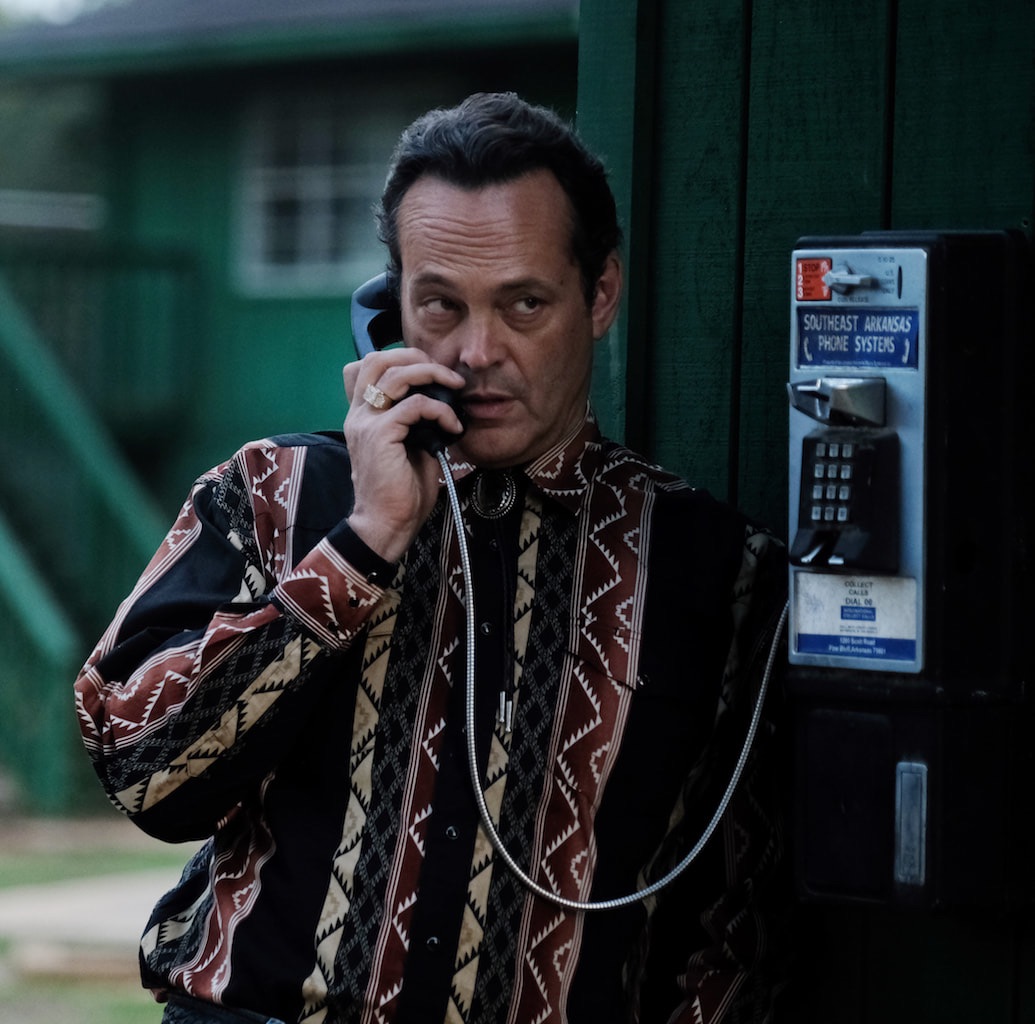Review:
"Arkansas"

Release Date: May 5, 2020
Rating: R Running Time: 115 minutes Do not let the first chapter of Clark Duke’s directorial debut Arkansas fool you into thinking that this is the Dixie Mafia southern-fried comedy we should expect from the star of Hot Tub Time Machine and Sex Drive. True, this SXSW Film Festival 2020 entry opens with a heavy emphasis of laughs courtesy of two oddball smalltime drug dealers, Duke’s Swin Horn and John Malkovich’s Bright. Horn, who is partnered with Liam Hemsworth’s stoic Kyle Ribb, stands out from the crowd because he carries himself like he is on permanent spring break. His wispy moustache and garish attire perfectly matches his smart-ass persona and supreme confidence. Then there is Malkovich, as Ribb and Horn’s supervisor, merrily getting his Razorback on and spitting out his Southern accent like chewing tobacco. Duke, though, hints early that Arkansas is less Burt Reynolds 1970s escapade, more Jim Mickle noir. “A lot of people don’t know about organized crime in the South is that it is not that organized,” intones Hemsworth gravely during Ribb’s introductory narration. “The term 'Dixie Mafia' has always even too generous. Implied too grand a scale. There’s a handful of a big time operators that run everything regionally but it’s nothing like the Italians or the Mexicans. No families. Just a loose affiliation of deadbeats and scumbags. No code of honor. No philosophy of life. It’s mostly doing solitary work but that suits me fine. Relying on other people is the fastest way to end up dead in this business.” Whereas Swin and Bright possess swagger to spare, obvious loner Ribb not only lacks his own philosophy of life but is solely defined by his actions in relation to the hazardous circumstances he is dropped into by Duke and co-screenwriter Andrew Boonkrong. Unfortunately, Hemsworth plays Ribb as nondescriptly written by Duke and Boonkrong, resulting in Ribb being nothing more than a cog in the wheel in a seemingly well-oiled organization founded by a mysterious drug dealer known as Frog. Which brings us to the second of Arkansas’ five chapters. Duke whisks us back to 1985 to reveal how Memphis pawn shop owner Frog (Vince Vaughn) becomes one of Arkansas’ most prominent drugs dealers. To some extent, Frog is Ribb’s mirror image. He is just as quiet and as resourceful. But Frog’s ambition makes him a more dangerous proposition than Ribb. Frog’s introduction marks a permanent shift in Arkansas’ tone from the jovial to the solemn. That is not to say Duke does not indulge in a few comical episodes, but he is now concerned with the fallout from a major turn of events. Ribb and Swin see an opportunity to demonstrate their initiative and reliability to Frog. The problem is, neither Ribb and Swin have met Frog or know how to contact him directly. Which not only causes many unforeseen problems but leads to the bloody violence we associate with drug trafficking. Duke and Boonkron deftly juxtapose Ribb and Swin’s bid for respect against Frog’s rise to power, with the two stories crisscrossing as necessary until they inevitably merge as one in the satisfying final chapter. If Frog’s chapters prove more potent than Ribb and Swin’s chapters, it is because the former offers more challenges and intriguing characters than the latter. (Ribb and Swin’s story is slowed down by Swin’s burgeoning relationship with local innocent Johnna, played with lovely devotion by Eden Brolin.) Frog’s main obstacle in making a pile of drug money is his boss Almond (Michael Kenneth Williams), who pays Frog a minuscule cut of their ill-gotten gains. The scenes between Vaughn and Michael Kenneth Williams crackle with equal amounts of deference and danger. It also helps that Vaughn always projects a quiet menace and calmed smarts that makes him a formidable presence in Arkansas. This is never more evident than when Frog “meets” Ribb and Swin for the first time. Then there are the twins. The less said about them, the better. In the Ribb and Swin chapters, Duke manages to remind us that Vivica A. Fox—as one of Frog’s close associates—has impeccable comic timing. Duke finds his footing once Arkansas’ transitions to a somber examination of organized crime in the south. He also is confident enough in his storytelling ability to allow several pivotal moments in Arkansas’ final minutes to occur offscreen. Duke continues to display some playfulness throughout Arkansas, most noticeably during an early Tarantino-esque death scene and by recruiting The Flaming Lips to perform in the film and contribute songs to the soundtrack, including moody covers of “The Night They Drove Old Dixie Down” and “In the Arms of Cocaine.” “A bored criminal is a good criminal,” Bright tells Ribb and Swin. That same sense of boredom certainly does not descend upon Arkansas. Note: Arkansas, which was scheduled to screen during SXSW Film Festival 2020, is now available on demand, digital, and Blu-Ray. Robert Sims Posted: April 5, 2020 Web site: https://www.lionsgate.com/movies/arkansas |
|
